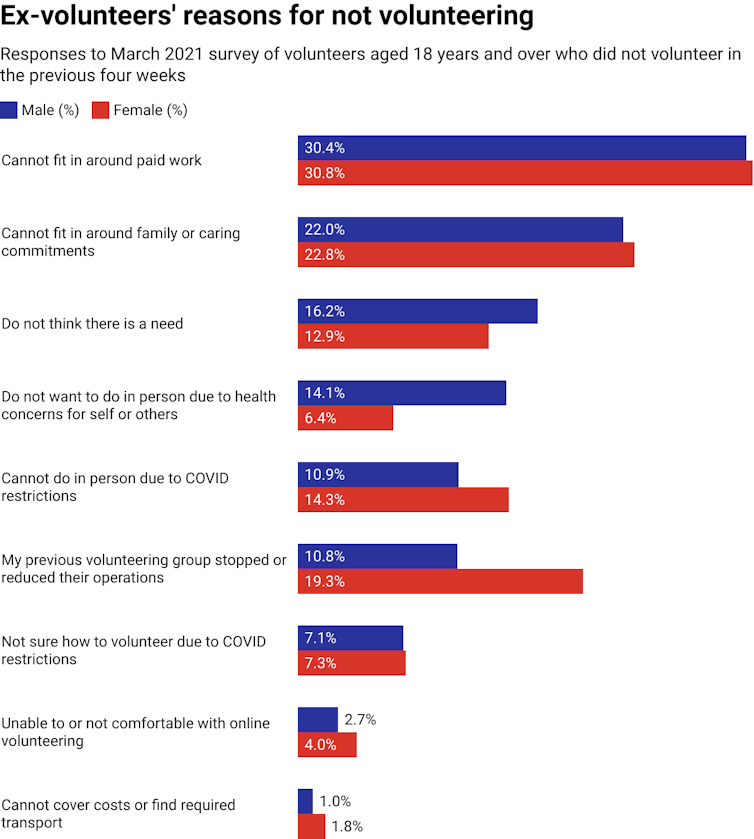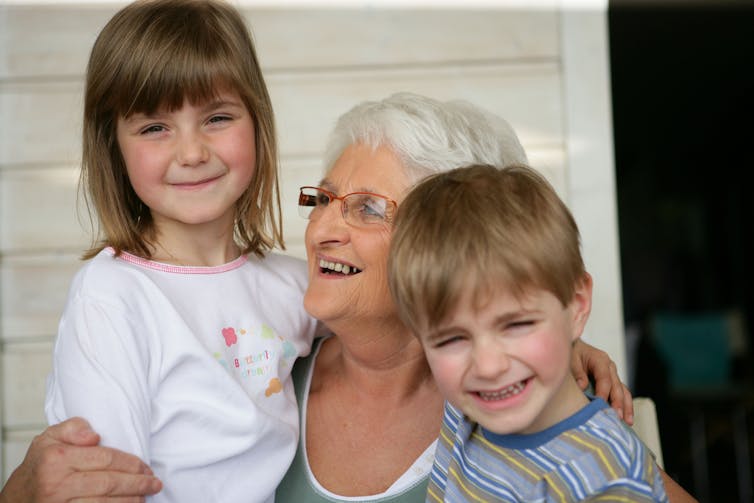Loss of two-thirds of volunteers delivers another COVID blow to communities
- Written by Amanda Davies, Professor of Human Geography, The University of Western Australia
In a year of lockdowns, social distancing and working from home, Australia’s volunteering rate plunged. In 2020, two out of every three volunteers stopped volunteering. This equates to a loss of 12.2 million hours per week of community-focused work.
In 2021, volunteering has yet to fully recover. Only one in five people are now volunteering.
This plunge in volunteering comes off the back of significant declines in the national rate of volunteering. The rate had already fallen from 36% in 2010 to 29% in 2019.
Read more: Why don't more people volunteer? Misconceptions don't help
This decline is happening at a time when demand for volunteer services has increased. In a national survey of volunteering organisations in December 2020 and January 2021, 43% reported an increase in demand for their services. And 56% reported needing more volunteers.
To sustain and rebuild their volunteer workforces, volunteering organisations have had to adapt their operations to enable more online and episodic volunteering. While COVID has accelerated these adaptations, we argue that for some they are long overdue.
Australia now faces a critical shortage of volunteers. Over the longer term the increased flexibility in volunteering work arrangements might be just the thing to turn around the decline in volunteering.
Why are we volunteering less?
In March 2021, the Australian Bureau of Statistics (ABS) surveyed Australians to understand the impacts of the pandemic. Among those who normally volunteer, the ABS found COVID-19 restrictions presented a barrier for 14% of women and 11% of men. For these committed volunteers, short-term lockdowns and restrictions on gatherings curbed their ability to volunteer.
 Note: Includes unpaid volunteering for an organisation or group. More than one response may have been reported. Components are not able to be added together to produce a total.
Data: ABS Household Impacts of COVID-19 Survey, CC BY
Note: Includes unpaid volunteering for an organisation or group. More than one response may have been reported. Components are not able to be added together to produce a total.
Data: ABS Household Impacts of COVID-19 Survey, CC BY
Some were unable to volunteer because their regular volunteering activities had been reduced or cancelled. Women were disproportionately affected, with 20% of women who normally volunteer, compared to 11% of men, not currently volunteering because their activities have been cancelled. This disparity reflects the highly gendered nature of volunteering in Australia.
There are many examples of cancelled community events and festivals. The volunteering sector’s own National Volunteering Conference was cancelled due to COVID-19.
Volunteering Australia reported that by February 2021 only 28% of volunteering organisations had returned to pre-pandemic levels of activity and 12% were still not operational.
COVID-19 has also caused uncertainty about how to volunteer. The ABS survey found 7% of regular volunteers are no longer sure how to engage in volunteering due to COVID restrictions, in spite of peak bodies offering advice to both volunteers and volunteering organisations.
Read more: As bushfire season approaches, we need to take action to recruit more volunteer firefighters
Informal volunteering has also decreased
COVID-19 has also had impacts on informal volunteering. Informal volunteering is when people provide unpaid help to someone living outside their household. This can be, for example, running errands, helping with childcare, or lending a hand with household cleaning and gardening.
 Australians rely heavily on informal volunteering to help them, for example, with caring for their children.
Shutterstock
Australians rely heavily on informal volunteering to help them, for example, with caring for their children.
Shutterstock
The decline in informal volunteering is perhaps surprising given the emergence of neighbourhood support groups organised via social media and new online community activities.
The ABS survey asked people why they had not provided informal volunteering over a four-week period. Of this group, 17% of men and 13% of women did not informally volunteer as they wanted to protect their or others’ health by minimising exposure to other people. About 5% of people could not help out friends, family or neighbours because of COVID restrictions.
What are the impacts for communities?
Volunteers are ever-present in all aspects of community life. Volunteers provide health and emergency services. They run sporting activities, environment and building conservation efforts. And many are the stalwarts of membership associations and local committees.
As Australians venture back to “normal” work and social lives, the absence of volunteers and the variety of community activities they make possible will become increasingly obvious. Without volunteers, some community services and activities we have become used to will be diminished, or will no longer exist at all.
For regular volunteers, the loss of participation in volunteering could reduce their personal well-being, skill development and social networks.
Read more: Why doing good can do you good
Re-engaging volunteers
As many workplaces shifted activities online, so too did some volunteering organisations. As with workplaces, this transition enabled volunteers to “work from home”. An estimated 50% of volunteer organisations moved volunteer roles and activities online to comply with COVID-19 restrictions.
The ABS survey found online volunteering is now available to about one in five volunteers. Of those who had the option to volunteer online, 76% had done so.
Undoubtedly, COVID-19 has accelerated the rate of adaptation of organisations. Many more now provide diverse opportunities for volunteers to engage in episodic forms of virtual and face-to-face volunteering.
People’s preference for diverse forms of volunteering was already increasing. Many volunteers have been calling for more flexible ways to volunteer for years. The COVID-forced adaptation might just be what the sector needs for longer-term sustainability.
The challenge now will be for volunteer organisations to continue to adjust to changing volunteering practices and preferences. They also need to convince volunteers it is safe to do so.
Authors: Amanda Davies, Professor of Human Geography, The University of Western Australia





